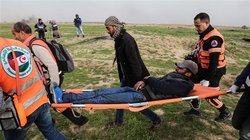 The United Nations has warned that the humanitarian situation in the besieged Gaza Strip is deteriorating due to a decade-long blockade by Israel on the Palestinian enclave, calling for an “immediate” end to the crisis.
The United Nations has warned that the humanitarian situation in the besieged Gaza Strip is deteriorating due to a decade-long blockade by Israel on the Palestinian enclave, calling for an “immediate” end to the crisis. RNA - In an address to the Committee on the Exercise of the Inalienable Rights of the Palestinian People, UN Secretary-General Antonio Guterres said on Friday that approximately two million Palestinians in Gaza “remain mired in increasing poverty and unemployment, with no access to adequate health, education, water and electricity,” leaving young people with “little prospect of a better future.”
Guterres further called on the Tel Aviv regime to “lift restrictions on the movement of people and goods, which also hamper the efforts of the United Nations and other humanitarian agencies, without naturally jeopardizing legitimate security concerns.”
The secretary general commended the UN agency for Palestinian refugees known as UNRWA for its "critical work" in Gaza, the occupied West Bank and across the region, urging the international community to “significantly” increase efforts to revitalize Gaza’s economy.
He further slammed as “illegal” Israel’s continued land expropriation and settlement expansion policies in the occupied territories, saying the settlement activities “deepen the sense of mistrust and undermine” the so-called two-state solution.
More than half a million Israelis live in over 120 settlements built since Israel’s occupation of the Palestinian territories of the West Bank in 1967. Much of the international community considers the settler units illegal and subject to the Geneva Conventions, which forbid construction on occupied land.
The UN chief also expressed regret at the decision by Israel to expel an international observer mission tasked with safeguarding Palestinians in the West Bank city of al-Khalil (Hebron).
Israel expelled the unarmed civilian observers after Prime Minister Benjamin Netanyahu said he "will not allow the continuation of an international force that acts against us."
The international mission, known as TIPH, was deployed in al-Khalil following an agreement reached between Israel and the Palestinian Authority in 1994, when an Israeli settler killed 29 Palestinian worshipers at Ibrahimi Mosque, which is revered by Jews, Christians and Muslims.
The group did not start its work in the city until 1998, after the Israeli military refused to leave al-Khalil following the establishment of an illegal Israeli settlement at the heart of the city.
Guterres expressed hope that “an agreement can be found by the parties to preserve this long-standing and valuable arrangement.”
“Palestinians have endured more than a half-century of occupation and denial of their legitimate right to self-determination,” he said.
According to Press TV, Al-Khalil, the West Bank's largest city, is a flash point. Over 200,000 Palestinians live in the city, along with several hundred extremist settlers who live in heavily fortified enclaves protected by the military.
The UN chief also described Gaza as “an integral part of a future Palestinian state,” saying, "Palestinian unity is needed for a politically stable, economically viable, sovereign and independent State of Palestine."
Israel has been enforcing an all-out blockade of the territory since 2007.
The UN has warned that the blockade would render it uninhabitable by 2020, but on Wednesday the UN agency said conditions “are worse” than when they made that prediction.
According to the UN development agency (UNCTAD) the decade-long siege and three Israeli-imposed wars have “eviscerated” Gaza’s productive capacity.
847/940